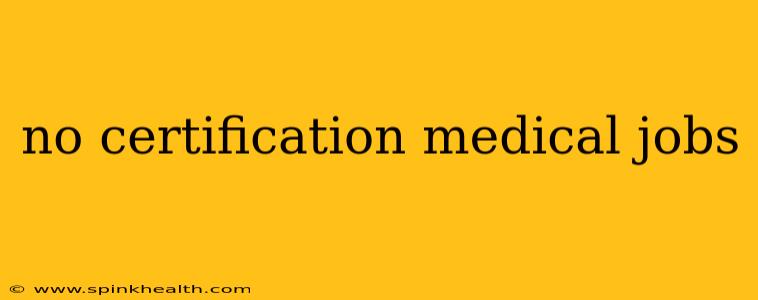The world of healthcare often conjures images of doctors in crisp white coats and nurses bustling through hospital hallways. But the truth is, the medical field is far more diverse than that, offering a multitude of rewarding career paths that don't require formal certifications. If you're passionate about helping others and seeking a career in healthcare without the commitment of lengthy certification programs, you're in luck! This article explores several viable options, answering frequently asked questions along the way.
What are some medical jobs that don't require certification?
Many roles within healthcare rely on on-the-job training, experience, and a strong work ethic more than formal certifications. These jobs often offer a direct path into the medical field, allowing individuals to gain valuable experience and potentially move into more specialized roles later on. Some popular options include:
-
Medical Assistant (MA): While certification can enhance opportunities, many medical practices hire MAs without formal certification, particularly if they have prior experience or demonstrate strong aptitude during the interview process. Their responsibilities can include taking patient vitals, assisting physicians during examinations, and managing patient records.
-
Home Health Aide (HHA): HHAs provide personal care and support to patients in their homes. While certification is often preferred, many agencies will hire individuals with a genuine desire to help and a willingness to learn. The emphasis is often on compassionate care and reliability.
-
Certified Nursing Assistant (CNA) - (Note: This technically requires certification but is often attainable relatively quickly): CNAs provide basic patient care under the supervision of nurses. While certification is required, the process is typically quicker and less intensive than other medical certifications, making it a relatively accessible entry point to the field.
-
Medical Receptionist: These vital roles manage patient appointments, answer phones, handle insurance claims, and generally maintain the smooth running of a medical office. No special certifications are usually needed beyond strong communication and organizational skills.
-
Medical Secretary: Similar to receptionists, medical secretaries handle administrative tasks but often with a focus on more complex documentation and scheduling. Again, experience and strong organizational skills are key.
-
Phlebotomist: While certification is beneficial, many laboratories and clinics hire phlebotomists with on-the-job training, particularly if they have a proven track record of carefulness and precision.
Do I need any experience for these jobs?
While formal certification isn't always a requirement, some level of experience or demonstrable skills is often helpful. Volunteering at a hospital, clinic, or nursing home is an excellent way to gain experience, build your resume, and make valuable connections within the healthcare industry. Even shadowing medical professionals can provide valuable insight and help you determine which area best suits your interests.
What are the salary expectations for these roles?
Salaries vary considerably depending on location, experience, and employer. Generally, entry-level positions without certification will command lower salaries than certified roles. However, the potential for growth and increased earning potential exists as you gain experience and advance within your chosen field.
Are there any educational requirements for these non-certification medical jobs?
While formal certifications aren't needed, a high school diploma or GED is generally a minimum requirement. Some employers may prefer candidates with post-secondary education, especially for roles involving more complex administrative tasks. Moreover, continuous learning and professional development are essential for career advancement in any healthcare setting.
How can I find these jobs?
Job boards like Indeed, LinkedIn, and Monster are good starting points. Networking within your community and directly contacting healthcare facilities are also effective strategies. Many smaller practices are more willing to offer on-the-job training to enthusiastic and reliable individuals.
The path to a fulfilling career in healthcare is not solely defined by formal certifications. Many rewarding and impactful roles are available to those willing to work hard, learn quickly, and demonstrate a genuine commitment to patient care. So, if you're drawn to the medical field but hesitant about lengthy certification programs, explore these options and discover your place within the healthcare community.

